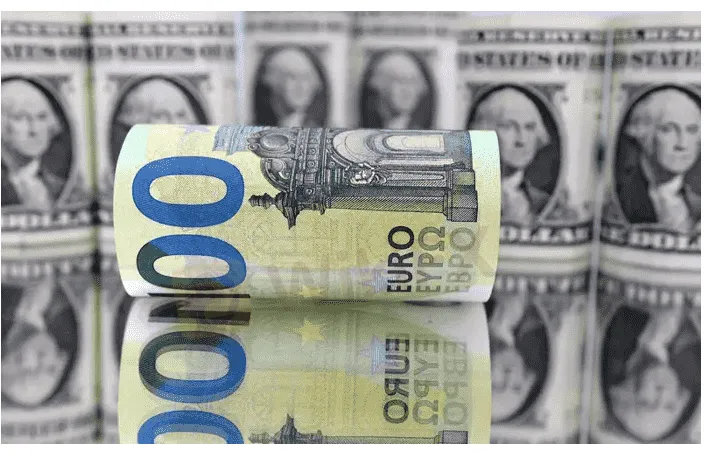简体中文
繁體中文
English
Pусский
日本語
ภาษาไทย
Tiếng Việt
Bahasa Indonesia
Español
हिन्दी
Filippiiniläinen
Français
Deutsch
Português
Türkçe
한국어
العربية
U.S. dollar share of global FX reserves rises in Q2; euro share slips
Abstract:The U.S. dollar’s share of currency reserves reported to the International Monetary Fund rose in the second quarter, with the Federal Reserve in the midst of an aggressive tightening cycle aimed at stamping out uncomfortably high inflation.

The greenbacks share of reserves rose to 59.5%, from 58.8% in the first quarter, IMF data showed on Friday.
The euros share, however, slipped to 19.8% in the second quarter from 20% in the first, declining for three straight quarters.
Global reserves, which are reported in U.S. dollars, are central bank assets held in different currencies used in part to support their liabilities. Central banks sometimes use reserves to help support their respective currencies.
“The new (IMF) figures illustrate the growing demand for the dollar as the Fed embarked on an aggressive tightening cycle which collided with Europes darkening growth outlook,” said Joe Manimbo, senior market analyst, at payments company Convera in Washington.
The dollar index rose 6.5% in the second quarter after advancing 2.4% in the first quarter, underpinned by the Feds policy tightening stance. So far in 2022, the greenback has surged 17% against a basket of major currencies, on track for its best yearly percentage gain.
The Fed, which has raised U.S. borrowing costs faster in 2022 than any time since the 1980s, has raised interest rates to a range of 3.0%-3.25%, from 0% in March. U.S. rate futures have priced in on Friday a 59.3% chance of another 75 basis-point rate increase.
In contrast, the euro zone has been hampered by an energy crisis, which has weighed on the euro even though the European Central Bank has been hiking interest rates as well.
In the second quarter, the euro dropped 5.3% versus the dollar.
The IMF data also showed the Chinese yuan‘s share of currency reserves edged up to 2.9% in the second quarter from 2.8% in the first three months of the year. In absolute terms, however, central bank holdings of the yuan fell 4.1% to $322.38 billion. The IMF started tracking the yuan’s share in 2017.
The yens share dipped to 5.1% during the period, compared with 5.3% in the first quarter. In dollar terms, yen reserves fell 8.3% to $578.52 billion.
IMF data also showed global reserves slid to $12.036 trillion in the second quarter, from $12.544 trillion in the first quarter. In the fourth quarter of 2021, reserves hit a record $12.92 trillion.

Disclaimer:
The views in this article only represent the author's personal views, and do not constitute investment advice on this platform. This platform does not guarantee the accuracy, completeness and timeliness of the information in the article, and will not be liable for any loss caused by the use of or reliance on the information in the article.
Read more

CMC Markets Australia Revenue Surges 34%, But High-Net-Worth Clients Face Tax Phishing Threat
CMC Markets Australia reports a 34% revenue surge. Simultaneously, the company's high-net-worth clients are facing a serious tax-related phishing threat.

E TRADE Review: Traders Report Tax on Withdrawals, Poor Customer Service & Fund Scams
Has your E Trade forex trading account been charged a withholding tax fee? Did your account get blocked because of multiple deposits? Did you have to constantly call the officials to unblock your account? Failed to open a premium savings account despite submitting multiple documents? Is fund transfer too much of a hassle at E Trade? Did you find the E Trade customer support service not helpful? In this E Trade review article, we have shared certain complaints. Take a look!

mBank Exposed: Top Reasons Why Customers are Giving Thumbs Down to This Bank
Do you find mBank services too slow or unresponsive? Do you find your account getting blocked? Failing to access your account online due to several systemic glitches? Can’t perform the transactions on the mBank app? Do you also witness inappropriate stop-level trade execution by the financial services provider? You are not alone! Frustrated by these unfortunate circumstances, many of its clients have shared negative mBank reviews online. In this article, we have shared some of the reviews. Read on!

In-Depth Uniglobe Markets Commission Fees and Spreads Analysis – What Traders Should Really Know
For experienced traders, the cost of execution is a critical factor in broker selection. Low spreads, fair commissions, and transparent pricing can be the difference between a profitable and a losing strategy over the long term. This has led many to scrutinize the offerings of brokers like Uniglobe Markets, which presents a tiered account structure promising competitive conditions. However, a professional evaluation demands more than a surface-level look at marketing claims. It requires a deep, data-driven analysis of the real trading costs, set against the backdrop of the broker's operational integrity and safety. This comprehensive Uniglobe Markets commission fees and spreads analysis will deconstruct the broker's pricing model, examining its account types, typical spreads, commission policies, and potential ancillary costs. Using data primarily sourced from the global broker inquiry platform WikiFX, we will provide a clear-eyed view of the Uniglobe Markets spreads commissions prici
WikiFX Broker
Latest News
In-Depth Uniglobe Markets Commission Fees and Spreads Analysis – What Traders Should Really Know
WikiFX's New Evaluation of ATM Capital LTD: Does its License Protect the Arab Investor?
Is Axi Legit? A Data-Driven Analysis of Its Regulatory Standing and Trader Feedback
How a Fake Moomoo Ad Led to the “New Dream Voyage 5” Scam
FXPesa Review: Are Traders Facing High Slippage, Fund Losses & Withdrawal Denials?
Trive Investigation: High Score, Hidden Risk - The Profit Paradox
CMC Markets Australia Revenue Surges 34%, But High-Net-Worth Clients Face Tax Phishing Threat
Bessent believes there won't be a recession in 2026 but says some sectors are challenged
Young Singaporean Trader Grew USD 52 into a USD 107,700 Portfolio
Is GGCC Legit? A Data-Driven Analysis for Experienced Traders
Currency Calculator



